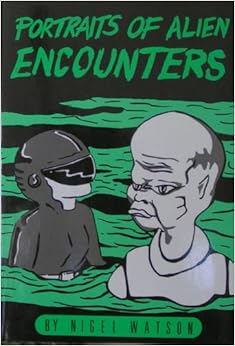
There was a case in Rogerson's IntCat from 1977 and as I could not find details anywhere else I decided to purchase the source cited by Rogerson -Portraits Of Alien Encounters by Nigel Watson.
The book arrived. I checked the index. No location or source as in IntCat. I read the book. Then re-read it -it is quite a good book and gives a lot of background to some cases that were only mentioned in brief in FSR or BUFORA Journal. So if you can get a copy (published in 1990) I'd recommend it for some fascinating case studies.
However, even on second reading I couldn't find the report. Even Nigel thought it was in the book. So I contacted him again and he checked but could not find it -so he's checking on an article he wrote that might mention the case.
But this is a perfect example of what I wrote about yesterday: you check the original source. In this case, again, the IntCat cited original source...was not. Now if you are putting together a slap-dash potpourri then you can expect this. However, if you are pronouncing on the short-comings of investigators and researchers and cases then you need to make sure that if you are creating a data base those criticisms do not come back to bite your arm-chaired arse.
Yet, several Ufologists suggested that this was a "great" or "worthwhile" catalogue and reliable. And they cite the catalogue -online and in print.
I just hope the more expensive books do contain the reports claimed!
The book arrived. I checked the index. No location or source as in IntCat. I read the book. Then re-read it -it is quite a good book and gives a lot of background to some cases that were only mentioned in brief in FSR or BUFORA Journal. So if you can get a copy (published in 1990) I'd recommend it for some fascinating case studies.
However, even on second reading I couldn't find the report. Even Nigel thought it was in the book. So I contacted him again and he checked but could not find it -so he's checking on an article he wrote that might mention the case.
But this is a perfect example of what I wrote about yesterday: you check the original source. In this case, again, the IntCat cited original source...was not. Now if you are putting together a slap-dash potpourri then you can expect this. However, if you are pronouncing on the short-comings of investigators and researchers and cases then you need to make sure that if you are creating a data base those criticisms do not come back to bite your arm-chaired arse.
Yet, several Ufologists suggested that this was a "great" or "worthwhile" catalogue and reliable. And they cite the catalogue -online and in print.
I just hope the more expensive books do contain the reports claimed!
update
In fact the case in question was not in the more expensive book and Nigel Watson could not find any case notes. Unbelievable. This is why critics can so easily dismiss Ufology because they can respond with; "So you made this up? You didn't make it up? So where is the file and case notes?"
As for Rogerson to call him a "sceptic" is an insult to sceptics. A sceptic is someone who follows the trail of evidence whether physical or anecdotal and reaches a conclusion based on that with no prejudice.
A debunker is someone who does not look at evidence and if he/she does and it is not what they want to read will change or put a spin on it so it falls into their outlook on the subject and 'proves' they are right.
Rogerson not only got facts wrong -deliberately or by quoting suspect sources or gave wrong sources. The Emma Funk case he notes was reported on p. 49 of Coral and James Lorensens The New UFO Breakthrough. I knew for a fact that this book was by Brad Steiger and Joan Whritenour and it is a very few brief lines. As a source it is therefore "noted" but offers nothing.
Rogerson's IntCat is full of such glaring errors as well as very biased conclusions and is not really a referable catalogue but more a ramble for debunking.
Be warned!

No comments:
Post a Comment